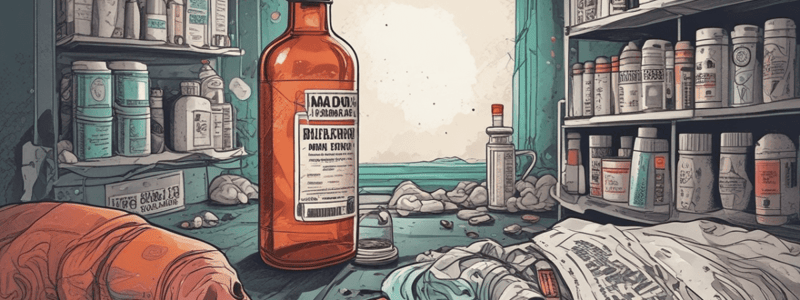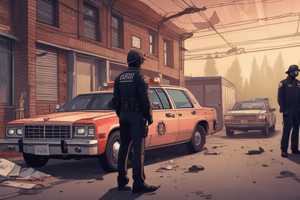Podcast
Questions and Answers
Sheriff’s Office deputies may render ______ aid to individuals suspected of opioid overdoses.
Sheriff’s Office deputies may render ______ aid to individuals suspected of opioid overdoses.
medical
[Blank] hydrochloride may be provided to trained Sheriff’s Office deputies as a tool to enhance the effectiveness of medical aid to individuals suspected of an opioid overdose.
[Blank] hydrochloride may be provided to trained Sheriff’s Office deputies as a tool to enhance the effectiveness of medical aid to individuals suspected of an opioid overdose.
Naloxone
If the individual’s breathing does not return to normal or if breathing difficulty resumes, after 2-3 minutes, a second dose of ______ hydrochloride may be given with a new device.
If the individual’s breathing does not return to normal or if breathing difficulty resumes, after 2-3 minutes, a second dose of ______ hydrochloride may be given with a new device.
naloxone
An ______ is a drug that counteracts the effects of another drug.
An ______ is a drug that counteracts the effects of another drug.
[Blank] hydrochloride is an emergency opioid antagonist that blocks the effects of opioids.
[Blank] hydrochloride is an emergency opioid antagonist that blocks the effects of opioids.
Indicators of an opioid overdose include: the patient will not wake up, will not respond to voice or touch, breathing is very slow, irregular, or has ______, and/or abnormally low heart rate or blood pressure.
Indicators of an opioid overdose include: the patient will not wake up, will not respond to voice or touch, breathing is very slow, irregular, or has ______, and/or abnormally low heart rate or blood pressure.
All individuals revived with the use of ______ hydrochloride should be encouraged to go to the hospital for further evaluation.
All individuals revived with the use of ______ hydrochloride should be encouraged to go to the hospital for further evaluation.
When ______ hydrochloride is administered, the Sheriff’s Office deputy shall originate a general offense report and document its use and results.
When ______ hydrochloride is administered, the Sheriff’s Office deputy shall originate a general offense report and document its use and results.
Study Notes
Opioid Antagonist Program
- Sheriff's Office deputies, as first responders, may render medical aid to individuals suspected of opioid overdoses.
- Naloxone hydrochloride may be provided to trained deputies as a tool to enhance the effectiveness of medical aid in opioid overdose cases.
Administration of Naloxone Hydrochloride
- A second dose of naloxone hydrochloride may be given with a new device after 2-3 minutes if the individual's breathing does not return to normal or breathing difficulty resumes.
- The individual should be kept under continued observation until EMS arrives.
Definition of Antagonist and Naloxone Hydrochloride
- An antagonist is a drug that counteracts the effects of another drug.
- Naloxone hydrochloride (Naloxone/Narcan) is an emergency opioid antagonist that blocks the effects of opioids administered from outside the body.
Indicators of Opioid Overdose
- Indicators of an opioid overdose include:
- The patient will not wake up or respond to voice or touch
- Breathing is very slow, irregular, or has stopped
- "Pinpoint pupils"
- Abnormally low heart rate or blood pressure
Post-Administration Procedures
- All individuals revived with the use of naloxone hydrochloride should be encouraged to go to the hospital for further evaluation.
- If the individual refuses transport to the hospital, they should be evaluated for a Marchman Act to determine if involuntary examination is needed.
- If naloxone hydrochloride is used on an individual facing criminal charges, they should be transported to Tampa General Hospital for medical clearance prior to being transported to central booking at the Orient Road Jail.
Documentation
- When naloxone hydrochloride is administered, the Sheriff's Office deputy shall originate a general offense report and document its use and results.
- The general offense report shall be titled "ILP Lead/Debrief - Overdose" (for those instances when Death Investigation or Marchman Act do not apply).
- The appropriate study code shall be used to indicate "Drugs - Naloxone - Effective" or "Drugs - Naloxone - Ineffective".
Studying That Suits You
Use AI to generate personalized quizzes and flashcards to suit your learning preferences.
Description
This quiz is about the Opioid Antagonist Program for Sheriff's Office deputies, specifically on the use of naloxone hydrochloride to aid individuals suspected of opioid overdoses.




